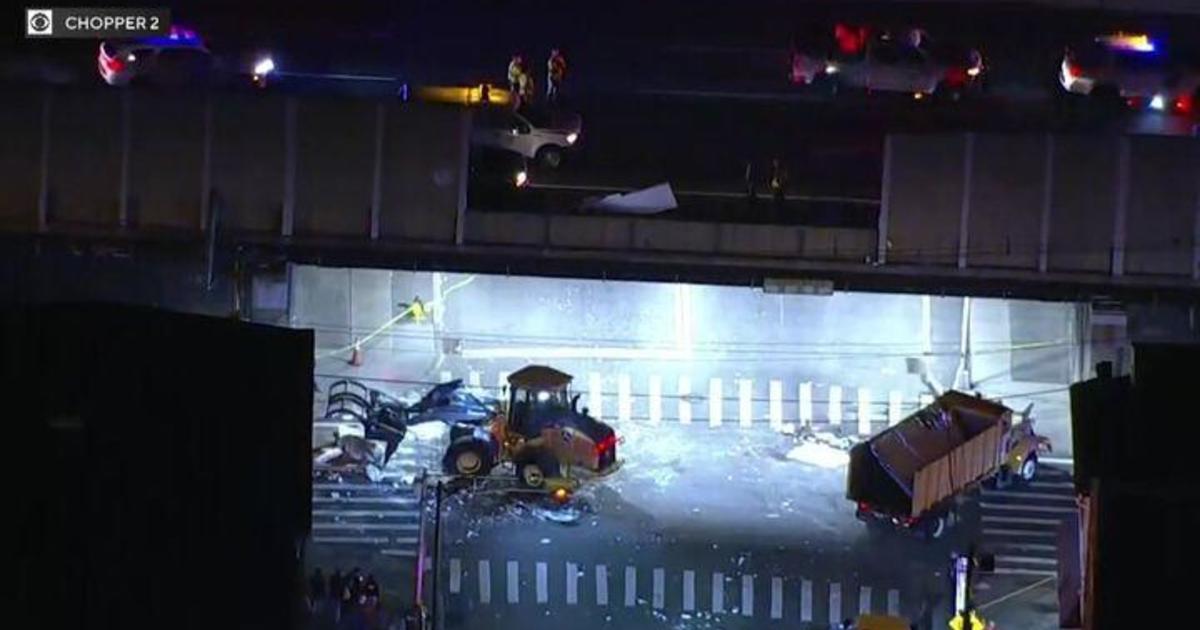Remnants Of Irma Bring Wind, Flooding To Southeast; Florida Surveys Damage
ATLANTA (CBSNewYork/AP) — The remnants of Hurricane Irma forced Atlanta's international airport, the world's busiest passenger airport, to cancel nearly 200 flights Tuesday.
The storm was also to blame for the deaths of two people in Georgia and two people in South Carolina.
Meanwhile, residents were getting a first look at the devastation back in Florida.
Meteorologist Keith Stellman said Atlanta's airport recorded sustained winds of 45 mph with gusts up to 64 mph.
The National Hurricane Center said it expects Irma to drop 5 inches to 8 inches of rain across South Carolina and the northern regions of Georgia, Alabama and Mississippi through Tuesday.
Georgia's Gov. Nathan Deal lifted a mandatory evacuation order for six coastal counties. The order allows local authorities to determine when residents may return home.
Deal called the storm an "unusual" one in that it affected the entire state, rather than being localized. For that reason, Deal said, recovery "could be a bit slower."
"This is a different kind of natural disaster. We have not had one like this in the state of Georgia for a long time," Deal said in a news conference on Tuesday.
Weakened into a tropical depression after strafing the Caribbean and Florida, Irma still had enough force when it swirled into Georgia to cause significant damage.
Heavy rain and strong winds caused flooding along the coast, downed power lines and sent trees crashing onto homes.
Irma sent 4 feet of ocean water into downtown Charleston, South Carolina as the storm's center passed 250 miles away. City officials urged residents to stay off the streets.
In Georgia, a man in his 50s was killed just outside Atlanta when a tree fell on his house, Sandy Springs police Sgt. Sam Worsham said; a woman died when a tree fell on a vehicle in a private driveway, the Forsyth County Sheriff's Office said on its website.
Charles Saxon, 57, became South Carolina's first recorded death when he was struck by a tree limb while clearing debris outside his home in Calhoun Falls amid wind gusts of about 40 mph, according to a statement from Abbeville County Coroner Ronnie Ashley. Another man was killed in a wreck on a wet and windy interstate as Irma moved past. Public Safety Director Leroy Smith said 21-year-old Zhen Tain died in the crash on Interstate 77 just east of Columbia.
Meanwhile in the Florida Keys, where Irma made landfall Sunday morning, piles of debris littered the streets. Homes were damaged, and boats had been tossed around.
Some residents were finally being allowed to return home Tuesday.
As CBS News' Mola Lenghi reported, emergency crews were racing to make the hardest hit areas of the state accessible Tuesday, but they were still trying to get a full picture of the damage and were warning residents recovery will take time.
In the Lower Keys, homes have been destroyed and roads have been washed away.
"We still have issues in the Keys getting the water and sewage back up and the power back," said Florida Gov. Rick Scott.
A long line of evacuees inched south on U.S. 1 Tuesday for a first look at Irma's destruction in the Keys.
Officials allowed Upper Keys residents back on Tuesday, but kept people out of the Lower Keys while they made emergency inspections and repairs.
In Marathon, residents who stayed behind were checking on neighbors.
"A lot of them left town. The ones that left here are still alive," said Carl Spavold. "Most of their boats – I've got one friend that lost his boat."
The view from above showed the island chain took a devastating hit from the Category 4 storm. Most of the area was left without power, water, sewage or fuel.
Meanwhile Highway A1A on Fort Lauderdale Beach was nearly clear of sand Tuesday. Sand covered the road a day earlier, reported Joan Murray of WFOR-TV, CBS4 Miami.
But the beach remains off limits to most. Most traffic lights were still out on the beach, and residents were still clearing debris around their homes.
There were checkpoints at every point leading to Fort Lauderdale beach. Only residents and people with a good reason like a business owner checking on an establishment were being allowed in.
"It's really hard. We have no AC, no power, nothing," one woman said as she drove through. "It's really hot, In our neighborhood, all the power poles are down>"
Business owners along the beach now shuttered for days because of the storm are anxious to reopen.
"We're all in this together. We're just as anxious as everybody else is, and we want nothing more than to restore the beach and the entire city of Fort Lauderdale to the way it was prior to, so I'm just asking that the folks be patient, and we're going to do this as quickly as we can," said Fort Lauderdale police Chief Rick Maglione.
A curfew was still in place for Fort Lauderdale residents Tuesday night, but the beach was expected to reopen for everyone on Wednesday.
More than 300 miles away, Jacksonville was trying to dry out. Irma swamped the city with record flooding, and more than 350 million people had to be rescued.
"The first responders just stepped up and did their jobs, and neighbors helped each other," said Jacksonville mayor Lenny Curry.
Irma caused some of Jacksonville's worst flooding in more than 150 years. The storm surge led to more than 300 rescues Monday.
"If this wasn't my job, I would have left the area days ago," Curry said.
Water was still blocking many streets, but city officials are allowing residents and business owners to get in and tackle the cleanup.
"We had sandbags out, but that didn't do anything," said Shauna Austin.
Austin spent the morning getting the water out of the dry cleaners where she works.
"Everybody's OK," she said. "We just have to do some cleaning."
Officials say it could take days before all the water recedes. Vince Cole is cleaning up after flood waters reached his front porch.
"We had 10 inches away from going in the house," he said. "It's never been like this."
Irma first made landfall Sunday in the Florida Keys as a Category 4 hurricane with 130 mile per hour winds. It pounded the entire state in the 48 hours to follow.
Millions across the state are without electricity.
"We understand what it means to be in the dark. We understand what it means to be hot and to be without air conditioning," said Rob Gould of Florida Power and Light.
Florida's largest utility is getting plenty of help from out of state, but said it could take 10 days or more to restore power in the hardest-hit areas.
(© Copyright 2017 CBS Broadcasting Inc. All Rights Reserved. The Associated Press contributed to this report.)



